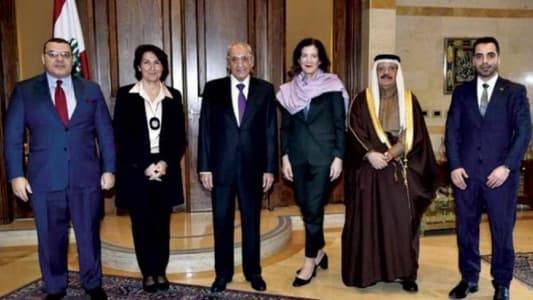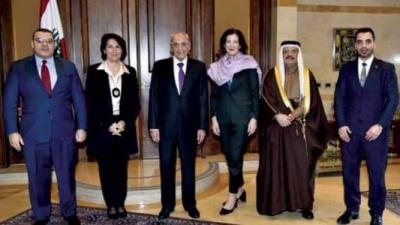In a clear political message to Lebanese officials, ambassadors of the so-called "Five-Party Meeting" warned that the failure to elect a president for the republic will necessitate a reconsideration of overall relations with Lebanon. They confirmed that support for Lebanon will begin only after the election of a president and the implementation of reforms. These statements came during the ambassadors' meeting with the caretaker Prime Minister Najib Mikati and Parliament Speaker Nabih Berri, following a week after the "Five-Party Meeting" held in Paris, which included representatives from Washington, Riyadh, Paris, Doha, and Cairo to discuss Lebanese affairs, concluding without any official statement or specific recommendations.
Yesterday, U.S. Ambassador to Lebanon Dorothy Shea, French Ambassador Anne Grillo, Egyptian Ambassador Dr. Yasser Alawi, Qatari Ambassador Ibrahim Abdulaziz Al-Sahlawi, and a representative from the Saudi Embassy in Lebanon, Fares Al-Amoudi, visited Berri and Mikati. They emphasized that genuine support for Lebanon will commence after the election of a new president, followed by the required reforms, according to a statement from Mikati's office.
While Berri's office only announced the meeting, Mikati's office quoted the ambassadors as confirming that “the absence of a statement from the Paris meeting is due to the ongoing and continuous discussions in support of Lebanon and the encouragement for electing a new president.” They warned that “failure to elect a new president will lead to a reevaluation of overall relations with Lebanon, as if the MPs do not fulfill their duties, foreign countries will not be more concerned than the Lebanese officials themselves.”
Sources familiar with the meeting that brought Berri and the ambassadors together described the atmosphere as “positive regarding the alignment of views between the delegation and the Parliament Speaker, particularly on the importance of expediting and agreeing on the election of a president.” They pointed out that there had been no discussion of names, but emphasized the importance of the president's program, which must be followed by the formation of a government capable of implementing reforms.
The sources told “Asharq Al-Awsat”: “It was clear from what the delegation said that the bet remains on the Lebanese interior and the Lebanese factions to elect a president as soon as possible.” Hence, the sources viewed the five countries' commitment to sending their representatives to meet with Lebanese officials as “evidence of their interest in Lebanon and an indication of their will to assist the Lebanese in helping themselves.”
The "Five-Party Meeting" took place last Monday in Paris with the participation of U.S. Assistant Secretary of State for Near Eastern Affairs Barbara Leaf, Saudi Royal Court Advisor Nizar Al-Alguba, Qatari Assistant Minister of Foreign Affairs Mohammad Al-Khalifi, French Presidential Advisor for the Middle East Patrick Durel, Director of the Middle East Section at the French Foreign Ministry Anne Gigan, and Egypt's Ambassador in Paris Alaa Youssef.
Sources familiar with the delegation meetings told “Asharq Al-Awsat” that “the ambassadors carried a strong and unprecedented message given the failure to elect a president more than three months after the vacancy," noting their emphasis that “there will be no assistance to Lebanon before fulfilling the constitutional requirement,” as they consider there has been “no response to the required reforms.” The sources quoted the delegation stating: “We care about Lebanon, but we cannot replace the Lebanese, and the responsibility lies with the MPs,” warning that “if they do not elect a president, the situation will worsen substantially,” hinting at “a negative stance from those obstructing the elections.”
Meanwhile, according to the sources, the delegation affirmed that “there is no veto on any individual, and they do not support one candidate over another, reiterating that the meetings will remain open.” On the other hand, the sources highlighted that the Parliament Speaker made it clear to the delegation that he had previously called for dialogue, but some refuse this step, deeming the sessions as having turned into a farce. He emphasized the need to create a conducive atmosphere for electing a president, stating: “We have weeks, not months, because the country can no longer bear it.” He also recalled the specifications for the president that he had previously mentioned, which are to “unite, not divide, and to be open to the international community.”




